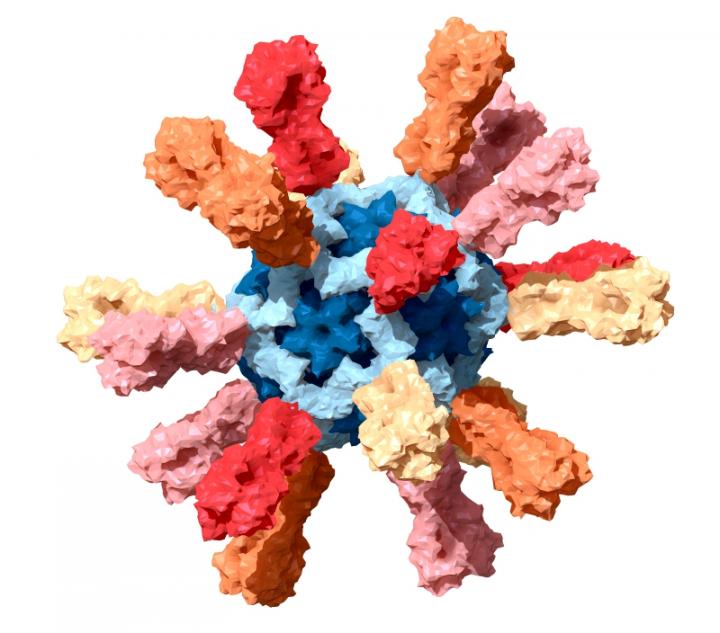Nanoparticle vaccine developed by NIAID scientists
A first-in-human, Phase 1 trial assessing the safety and immunogenicity of an investigational nanoparticle influenza vaccine designed to provide long-lasting protection against multiple flu virus strains has begun at the National Institutes of Health Clinical Center in Bethesda, Maryland. Healthy participants 18 to 50 years old will receive either a licensed seasonal influenza vaccine or the experimental vaccine, FluMos-v1. Scientists from NIH’s National Institute of Allergy and Infectious Diseases (NIAID) developed FluMos-v1 to stimulate antibodies against multiple influenza virus strains by displaying part of the influenza virus hemagglutinin (HA) protein on self-assembling nanoparticle scaffolds. Alicia T. Widge, M.D., of NIAID’s Vaccine Research Center (VRC), is the principal investigator of the NIAID-sponsored single-site trial.
“The health and economic burdens of influenza are substantial, and the world badly needs improved flu vaccines,” said NIAID Director Anthony S. Fauci, M.D. “I am encouraged by the great promise of the VRC nanoparticle vaccine candidate, which so far has performed very well in pre-clinical testing.”
Standard influenza vaccines must be reformulated and administered annually to match changes in the HA protein in the viral strains predicted to dominate in the upcoming influenza season. If the vaccine is not well matched to dominant circulating virus strains, the antibodies elicited may provide sub-optimal protection. So-called universal influenza vaccines are being developed and tested by many research groups and could one day eliminate the need for annual vaccination by generating long-lasting antibodies to protect against many existing or emergent influenza virus strains, including those not represented in the vaccine.
Similar to commercially available flu vaccines, the experimental nanoparticle FluMos-v1 vaccine is designed to elicit antibodies directed against the HA protein from four different virus strains, two influenza type A strains of H1 and H3 subtype and two influenza type B strains. However, unlike conventional flu vaccines, FluMos-v1 displays multiple copies of each of the four HA types. The 20 HA epitopes arrayed in repeating patterns on the nanoparticle scaffolds sent a strong signal to the immune system and prompted a robust antibody response in animal models.
In their recently published animal study, VRC scientists led by Barney S. Graham, M.D., Ph.D., and Masaru Kanekiyo, D.V.M., Ph.D., and their collaborators from the University of Washington tested the investigational nanoparticle vaccine in mice, ferrets and monkeys, and compared the immune responses generated to those made by a commercially available seasonal flu vaccine. FluMos-v1 performed as well as or slightly better than the commercial vaccine in eliciting antibodies matched to the vaccine’s HA components. FluMos-v1 vastly outperformed the seasonal flu vaccine in its ability to elicit protective antibodies to two influenza type A subtypes (H5 and H7) not in the vaccine.
The clinical trial aims to enroll 35 participants, 15 of whom will receive a single intramuscular injection of an FDA-licensed, quadrivalent seasonal flu vaccine. Five participants will receive one 20-microgram (mcg) dose of the investigational vaccine by intramuscular injection. If there are no safety concerns detected at that dosage, an additional 15 volunteers will receive one 60-mcg dose of the investigational vaccine.
Participants will keep a diary for a week following vaccination in which to report any signs or symptoms, including redness, pain or swelling at the injection site, tiredness, headache, muscle aches or joint pain. All volunteers will record their temperature daily and will measure any swelling or redness at the injection site. Volunteers will return to the NIH Clinical Center periodically for 40 weeks–over one flu season–after inoculation and will provide blood samples. The blood samples will yield information about the safety of the investigational vaccine and also will be assessed to determine levels of HA-directed antibodies produced following vaccination. Participants who receive FluMos-v1 will have oral mucosal samples taken that will be used for research purposes to determine the oral mucosal immune response to the vaccine.
###
Further information about the trial is available at clinicaltrials.gov using the identifier NCT04896086.
Reference: S Boyoglu-Barnum et al. Quadrivalent influenza nanoparticle vaccines induce broad protection. Nature DOI: 10.1038/s41586-021-03365-x (2021).
NIAID conducts and supports research–at NIH, throughout the United States, and worldwide–to study the causes of infectious and immune-mediated diseases, and to develop better means of preventing, diagnosing and treating these illnesses. News releases, fact sheets and other NIAID-related materials are available on the NIAID website.
About the National Institutes of Health (NIH): NIH, the nation’s medical research agency, includes 27 Institutes and Centers and is a component of the U.S. Department of Health and Human Services. NIH is the primary federal agency conducting and supporting basic, clinical, and translational medical research, and is investigating the causes, treatments, and cures for both common and rare diseases. For more information about NIH and its programs, visit http://www.
Media Contact
Anne A. Oplinger
[email protected]
Original Source
https:/
Related Journal Article
http://dx.





